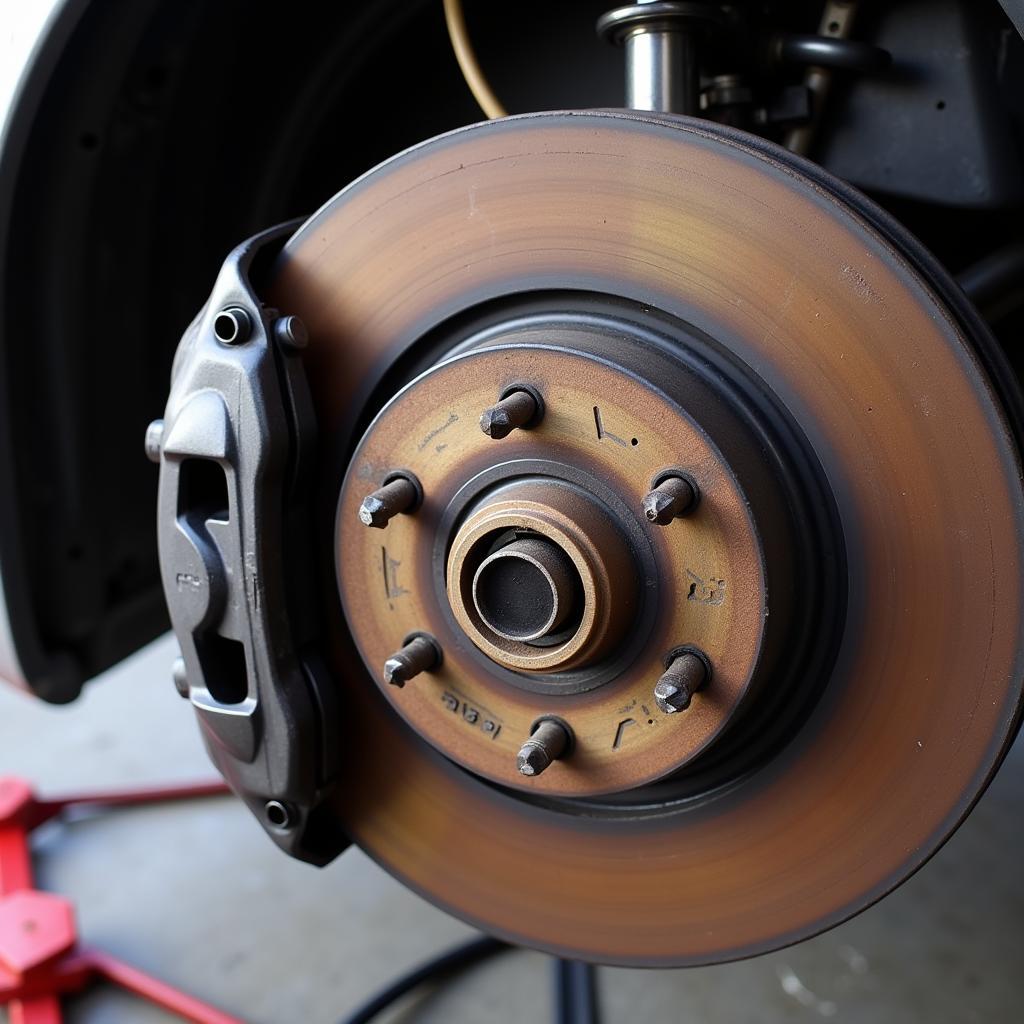Low brake fluid is a serious safety concern that can lead to brake failure. Recognizing the warning signs early can prevent costly repairs and potentially dangerous situations. This article will guide you through the common indicators of low brake fluid, explain why it’s crucial to address this issue promptly, and offer advice on preventative measures.
Recognizing the Warning Signs of Low Brake Fluid
There are several telltale signs that your brake fluid level is dangerously low. These include a spongy or soft brake pedal, unusual noises coming from your brakes, and an illuminated brake warning light on your dashboard. Ignoring these signs can lead to significant problems, including complete brake failure.
The Spongy Brake Pedal: A Key Indicator
A soft or spongy brake pedal is often the first noticeable sign of low brake fluid. This means you have to press the pedal further down than usual to engage the brakes. This reduced responsiveness is caused by air entering the brake lines, which happens when the fluid level drops below a critical point.
 Spongy brake pedal indicating low brake fluid
Spongy brake pedal indicating low brake fluid
Unusual Brake Noises: Grinding and Squealing
Low brake fluid can also manifest as unusual noises emanating from your brakes. Grinding or squealing sounds can indicate metal-on-metal contact within the brake system, a direct result of insufficient fluid pressure. This friction can cause significant damage to your brake components.
The Brake Warning Light: Don’t Ignore It
Most modern vehicles have a brake warning light on the dashboard. This light is designed to illuminate when there’s a problem with your brake system, including low brake fluid. Never ignore this warning; it’s a crucial signal that requires immediate attention.
Other Potential Symptoms
Besides the most common signs, other symptoms may indicate low brake fluid, such as a longer stopping distance or pulling to one side when braking. These less obvious signs should also be taken seriously.
Why is Low Brake Fluid Dangerous?
Low brake fluid compromises the hydraulic pressure necessary for proper brake function. This can lead to a delayed or ineffective braking response, increasing the risk of accidents. Furthermore, it can cause extensive damage to the brake system, requiring costly repairs.
“Ignoring low brake fluid is like playing Russian roulette with your safety,” says automotive diagnostics expert, Dr. Michael Stevens, Ph.D., M.S.A.E. “The consequences can be catastrophic.”
Causes of Low Brake Fluid
Several factors can contribute to low brake fluid levels, including brake pad wear, leaks in the brake lines, and worn seals in the master cylinder. Regular brake inspections are vital to identify and address these issues promptly.
Checking Your Brake Fluid Level
Checking your brake fluid level is a straightforward process. Locate the brake fluid reservoir, typically a translucent container near the firewall. The reservoir has minimum and maximum markings. Ensure the fluid level falls within this range.
What to Do if You Suspect Low Brake Fluid
If you suspect your brake fluid is low, do not attempt to drive the vehicle. Contact a qualified mechanic immediately for a thorough inspection and necessary repairs. Driving with low brake fluid can be extremely dangerous.
“A simple brake fluid top-up might seem like a quick fix, but it doesn’t address the underlying problem,” explains automotive engineer, Ms. Sarah Johnson, P.E. “A professional inspection is crucial to pinpoint the cause of the low fluid and prevent future issues.”
Preventative Measures
Regular brake maintenance is the best way to prevent low brake fluid issues. This includes periodic brake inspections, fluid flushes, and timely replacement of worn brake components.
Conclusion
Recognizing the warning signs of low brake fluid is paramount for ensuring your safety and preventing costly repairs. Don’t ignore a spongy brake pedal, unusual noises, or an illuminated brake warning light. Address these issues promptly to avoid potentially dangerous situations and keep your vehicle in optimal condition. Regular maintenance is key to preventing low brake fluid and maintaining a safe and reliable braking system.
FAQs
- How often should I check my brake fluid level?
- What type of brake fluid should I use?
- Can I top off my brake fluid myself?
- How much does a brake fluid flush cost?
- What are the signs of a brake fluid leak?
- How long does a brake fluid flush take?
- What causes a brake warning light to come on?
“Remember, preventative maintenance is always cheaper and safer than dealing with the consequences of neglect,” reminds Dr. Stevens.

